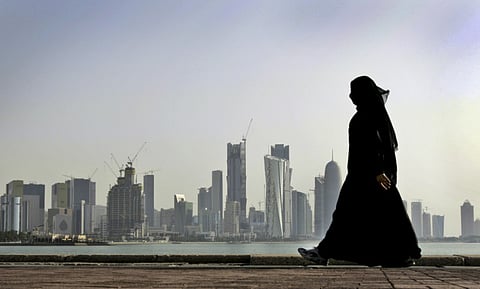Change in Qatari policies key to resolving crisis
The ongoing Qatari crisis and the festive occasion of Eid Al Fitr were the two topics that captured the focus of newspapers in the region

The Arab and Gulf demands are now in the hands of those who implement Qatar’s policies, said the UAE’s Al Bayan. “It is no secret that Qatar’s arrogance is merely an attempt by its policy leaders to save face, and the reality is that they were pleading for a list of demands that they could implement so that they can extract themselves from the predicament that they have brought upon their country and people. The leaders of Qatar’s policies now stand before the eyes of their people, and they stand before a decisive moment: They can be a part of the Arab ranks, which is driven by a policy of determination, or remain stranded on Iranian shores that only welcomes delinquents. That said, Doha leaking the Arab-Gulf Cooperation Council (GCC) demands is nothing more than a desperate attempt to disregard the equation of political size and weight. This equation is not measured by investments, wealth or any foreign links, but rather is governed by a strategic vision that was earlier referred to by the UAE, when it said that the solution lies in Riyadh and with King Salman.”
Saudi Arabia is keen on the unity of GCC ranks within a system of cooperation, wrote Saudi Arabia’s Al Yaum. “Qatar’s policy of cooperating with terrorist organisations represents a flagrant violation of not just the GCC’s system and principles, but also all international charters that have laid out clear lines for combating terrorism. The Gulf nations did not ask for American or European mediations to address the current crisis, because this issue must be resolved internally, among GCC nations. Saudi Arabia is asking for a system of guarantees and regulations that ensure Qatar does not violate any agreements or commitments. Resolving the Qatari crisis revolves around a change in Qatari policies and its notorious methods in supporting terrorism through financial and political means, as well as through the media. This is not just a demand from Saudi Arabia and other countries involved in the boycott, it is a solution that the rest of the world agrees on in view of the threat that terrorism poses to the security, stability and sovereignty of all nations.”
The Qatari crisis has taken a dangerous turn with the involvement of Turkey, which expressed its support for Qatar’s practices, wrote Egypt’s Al Ahram. “Turkey had continuously claimed that it is taking a neutral stand regarding the crisis and reiterated its willingness to play the role of a mediator, at a time when it is known that Turkey and Qatar never hesitated in supporting and financing terrorism, and offering residence to leaders of terrorist groups. Turkey should have adopted a mediator role similar to that of Kuwait, which actually played the role of a mediator between parties involved in the crisis. When the four nations handed their demands to Qatar, Turkey should have urged it to accept the demands to end its isolation. Instead, Turkish leaders chose to issue statements that only served to further aggravate the situation.”
Meanwhile, the Jordan Times said that during Eid Al Fitr, Muslims pray and hope for good tidings, for personal well-being and for peace in their countries and all over the world. “So, hopefully, the wars in Syria, Libya and Yemen will come to an end, terrorists will be weeded out from the midst of terrorised populations, leaders will see the merits of harmonious relations and the darkness enveloping much of the Arab world will give place to sunlight and hope.”


